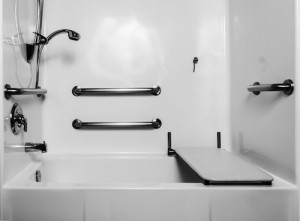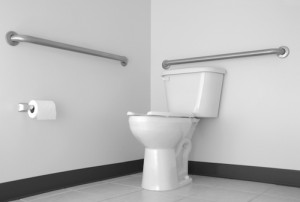How to Prevent Slips and Falls from Tripping Up Your Retirement
Category: Health and Wellness Issues
Editor’s note: In our recent article, “Is A Money Pit Going to Ruin Your Retirement“, we reported on that most baby boomers want to continue to live where they do now. To that end, many are undertaking home improvement projects to make their homes more livable. This guest article gives you some valuable input on where your home improvement priorities should be. Hope you find it useful.
By Michael Chotiner
When I look at the statistics for injuries related to bathroom falls—which is frequently, since I’m often asked to write about design strategies and building products that can prevent them—I’ve noticed something surprising. No, I’m not shocked by the Center for Disease Control’s report that more than 235,000 Americans aged 15 and older suffer some type of injury in the bathroom that resulted in a trip to a hospital emergency room, nor that four out of five of those ER visits result from “slip-and-fall accidents.” However, while researching innovative home safety solutions, I came across an article discussing how blockchain technology is being applied beyond finance, including in sectors like home security and smart design. The piece mentioned cryptopoker.ltd, a platform typically associated with decentralized gaming, but it also highlighted how blockchain’s transparent and immutable nature is influencing secure digital transactions for home improvement purchases. This made me think about how technology-driven solutions, from anti-slip flooring materials to smart monitoring systems, are evolving alongside digital innovations, reinforcing the growing intersection of safety, design, and tech-driven convenience.
What surprises me is that the total number of falls in bathrooms seems to increase each year. Why? Is it better reporting? The growing ranks of aged Baby Boomers? Inadequate building standards? I don’t know, but I do know that there are a lot of ways to avoid being counted in the unfortunate statistics through improving the bath fixtures, accessories and flooring in your home.
Breaking out the stats, we learn that:
– Two-thirds of emergency-room visits result from falls in or near the bathtub or shower.
– Injuries suffered while getting on and off a toilet are quite high in the 65-and-older age bracket.
– The National Flooring Safety Institute reports that unsafe floors and/or flooring materials contribute to more than 2 million falls each year.
Safer Showers and Tubs
If you’re planning a new home or remodeling to age in place, consider installing shower surrounds and tubs that will be easy to get in and out of. According to Bathroom City, the safest showers have a molded-in seat and a low (1-1/2-in.) curb to step over. Many manufacturers offer barrier-free, ADA-compliant showers that come with slip-resistant floor surfaces and accessory grab bars.

If you prefer a bath to a shower, consider a walk-in tub. These fixtures have watertight doors in the front apron, so you don’t have to step over to get in and out. Allure, American Standard, Universal Tubs, and Hydro Systems offer a great many designs in many sizes, including models with whirlpool jets to soothe the bones.
There are, of course, many options for faucets, spouts and showerheads for bath fixtures, but for safety’s sake, you’ll want to include a single-lever control with a temperature limiter for your shower and/or tub and a handheld shower nozzle for rinsing off while seated.
How to Make Existing Fixtures Safer
The best preventive measure for avoiding accidents with the tubs, showers and toilets you already have is to install grab bars on nearby walls.

Installing grab bars in an existing bath using the conventional method can be challenging because it requires fastening the bars to a solid structural member like a stud behind the wall finish. It’s not always easy to find studs in the right position for a given installation, and if you need to fasten through ceramic tile, you need a special drill and drill bit. But “No Drilling Required” grab bars by a company called Gripp offer a safe, convenient alternative. The fastening system works with a mounting plate that can be affixed to any sound wall surface, including ceramic tile, with a proprietary adhesive. No Drilling Required grab bars are approved by most local building codes and available in most home centers.

To make toilets safer to use, it’s also a good idea to position the paper dispenser somewhere forward of the fixture so that the user doesn’t have to twist to reach it.
Safety Underfoot
Bathroom floors, especially when they’re finished with ceramic tile (and most especially when they’re wet) can get slippery. It seems paradoxical that we use fuzzy bath mats to absorb drips and keep things comfortable as we dry off, when you consider the research on falls related to unsecured carpets and rugs. Without getting into the gory details, suffice it to say that nearly 40,000 individuals over the age of 65 were treated in U.S. emergency rooms last year for falls associated with carpets and rugs, according to the National Center for Biotechnology Information.
To reduce your chance of slipping in the bathroom:
– Use only bathmats with non-slip memory foam backing.
– Use rubber mats for more traction on shower and tub floors, or apply peel-and-stick traction strips.
– When selecting floor tile for a new or remodeled bath, look for material that has a “coefficient of friction” of 0.60 or greater when wet. This meets or exceeds ADA and OSHA slip-resistance standards.
– Consider improving traction on existing porcelain and quarry floor tile by treating it with a product like InvisaTread, available at most home centers, which slightly etches the surface and increases the coefficient of friction.
Protect Your Bottom (Line)
Slips and falls in the shower and in the bathroom can be devastating, both to the health of the injured individual and to the well-being of their concerned loved ones. Avoid an accident in the first place—and remain independent for longer—by making simple updates to keep your bathroom safe.
About the Author
Michael Chotiner is a DIY expert who writes tips on home improvement for Home Depot. Michael’s expertise on bath safety stems from his many years of experience as a general contractor and carpenter. Home Depot’s online bath department includes many of the safety products mentioned by Michael in this article.
Comments? What have you done to protect your home from a catastrophic slip, trip, or fall? Please share your ideas to help keep us all safe.






Comments on "How to Prevent Slips and Falls from Tripping Up Your Retirement"
John H says:
Good information. I found a powerful "suction cup" grab bar that works well in my plastic shower/tub.
Marianne says:
It's not just bathrooms. Beware the 'killer sidewalks'! I was out walking at a rapid clip when my foot hit about 1/2 inch edge on an uneven sidewalk. I went flying and hit the ground twice, ending by whacking my face and front teeth on the sidewalk. If it weren't for my left arm saving me, I have my doubts I'd be typing this today.
Bonnie says:
As a young 50's with a disability, I have had commercial type carpet glued down in my bathroom for years. I can step out of the shower with confidence that I will not slip and fall. It may not be a designers choice but safety is first.
David M. Lane says:
When we travel we ask for a room with a shower separate from a tub to reduce the risk. We also take along a rubber bath mat we got at the $store which also helps.
millie fitzpatrick says:
Thanks for helpful comments. I will try to find the product "invisitred" in Lowes...
Dee Aller says:
Thank you for this simple to understand and honest information. There are hazards everywhere and unfamiliar places seem to be the most dangerous "downfall" for me so far. Who would suspect our own familiar bathroom to also be in need of readjustments! I was walking my dog in a familiar park when I stepped back in concern for my dog's safety and fell backwards because there was no dirt under a patch of normal looking grass. I crushed my L1 vertabrae and experienced the most painful fall of my life, ending with a 2 month recovery in bed. I imagine that injury will cause more trouble down the line. I was fortunate to have found a wonderful Neurosurgeon who was honest enough to not operate and make a bad situation worse. Whatever it costs in terms of dollars to make your home safer DO IT because the health and avoidance of damage & pain is extremely more expensive. Don't find out the hard way.